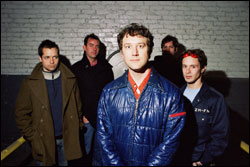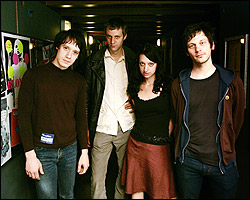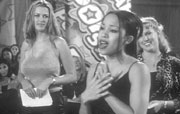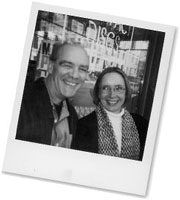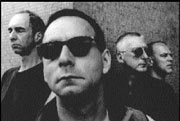In the middle of winter, days are staccato short and the workday seems unjustly long, but at the Up Records office, the mood manages to transcend that of the daily grind. When it’s your job to make sure that the good people of this small globe have access to records like Quasi’s Field Studies, there’s an element of accomplishment that makes work feel less than usual like, well, work.
That hobbylike atmosphere is what Chris Takino had in mind when he started the label 10 years ago. Like lots of indie imprints, Up began because Takino’s friends were making music he loved and he wanted people to hear it. He kept his job answering phones at Sub Pop and considered Up a hobby, thinking he would just release singles. When Takino’s friend Doug Martsch and his band, Built to Spill, had songs for a new record, Takino went to his bosses at Sub Pop and urged them to put it out. But, as Megan Jasper, current general manager of Sub Pop and Takino’s former roommate and close friend, recalls, Sup Pop’s Jonathan Poneman always thought Takino would make a better A&R rep than a receptionist, and he encouraged Takino to put out the record himself, going as far as to front him some money to make it happen. Up, as a full-fledged label, was born.
What no one knew at that time was that Built to Spill would go on to sign—at Takino’s urging—with Warner Bros., Up bands like Modest Mouse and 764-HERO would become indie-rock fixtures nationally as well as here at home, and, tragically, Takino would be diagnosed, in the late ’90s, with leukemia. Jasper remembers that even as Takino’s health declined while he was in an experimental hospital in Texas, his main concern was that Up artists would be able to keep their music in circulation. He first considered folding the company and handing over the masters to the bands, but later decided to turn over the label to his then boyfriend, Pete Ritchey, with the caveat that no new bands be added, that Up continue solely with the artists Takino had signed. After Takino passed away in October 2000, Ritchey carried on and the music kept going.
Luckily, Cornish grad Brent Arnold already had his foot in the door. In 1999, Up had released a 7-inch by the songwriter, cellist, and composer. Additionally, Arnold has either played strings or arranged instruments on just about every Up release. (Check the liner notes—more often than not, he’s there.) Not incidentally, Arnold also plays with Thurston Moore’s favorite Seattle-based free-jazz saxophonist, Wally Shoup, in the improv outfit Project W, and has studied with former Coltrane collaborator Michael White. Now with his own band—and a sound that should appeal to anyone who has ever wished the Dirty Three could marry an American roots band—Brent Arnold and the Spheres are Up’s “newest” artist, and the new Last Boat is Up’s latest release.
“Chris saw me at the bus stop with my cello,” says Arnold of their initial meeting. “We somehow wound up talking about Eric Dolphy and a couple of obscure and great ‘out-jazz’ records he made with a cellist—very unusual for jazz, and unheard of back then. This is a pretty obscure thing to know about, but it turned out we were both really into those records. Later, I’d learn that Chris knew nearly everything about nearly all kinds of music. The cellist on those records, Ron Carter, was really a bass player, and his cello playing was kind of shaky and not always in tune. I mentioned that to Chris, saying that the actual cello playing was kind of messed up on those records, and he said that, to him, that imperfect quality just made it sadder. That’s when I realized that this guy was someone who really listened deeply and thought about music deeply and cared about it deeply. God, I miss that guy.”
It’s a sentiment that many in Seattle share, yet they smile when they express it. Jasper remembers that Takino liked “smart, weird people with big hearts”—the misfits, the outliers. Over the past week, Up’s anniversary shows have brought together a decade of these diverse, intelligent renegades, all of whom have learned—through Takino—that life is worth fighting for and great records are worth working at. And that’s what you feel when you sit on the sagging thrift-store couch in Up’s office; that’s what you feel listening to Last Boat. You feel life, going on.
For information on the remaining Up Anniversary shows, see Eight Nights, p. 57.
